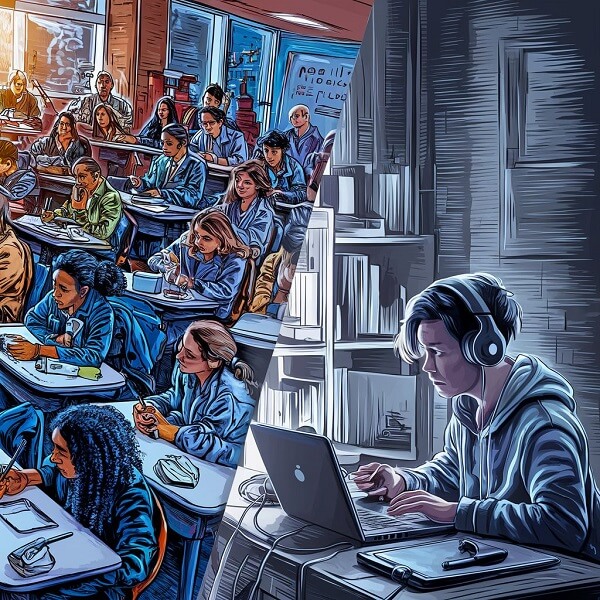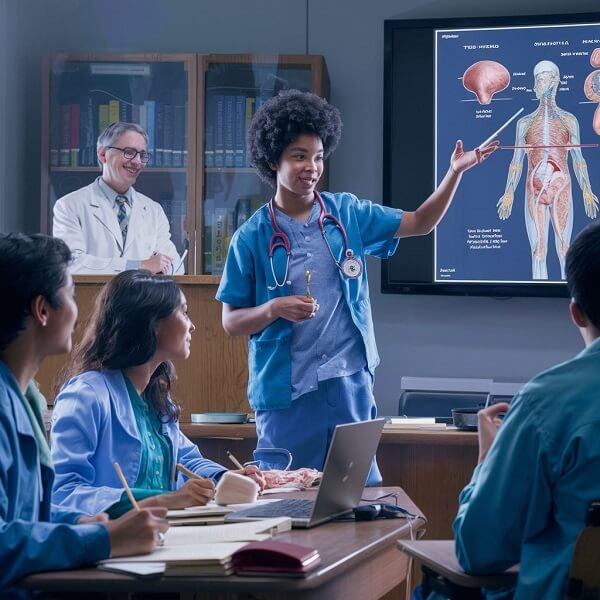How In-Person Medical Education Unlocks Your Full Potential


Imagine performing a surgical procedure or diagnosing a patient's illness for the first time. Can a virtual classroom equip you with the skills and confidence needed for these real-life challenges?
In this blog, we’ll give you all the evidence-based reasons that make studying medicine or dentistry in person the best and most reliable way to get the knowledge and skills needed to become a successful doctor or dentist.
Table of Contents
The Essential Benefits of Studying Medicine or Dentistry In-Person
Currently, online courses let you study at home for the first 1-3 years, after which you will need to be present for practical training. However, in those early years, you will be missing out on crucial experiences that would normally serve as your foundation for building the confidence needed to excel in the medical field.
Practical skill development through simulated environments is absolutely vital in the field of medical education. The earlier you start getting experience, the more time you will have to build your skill set that will help you succeed in a professional environment.
Many medical and dental schools provide hands-on learning from Year 1 and some, like the Catholic University of Murcia, even offer clinical experience and internships right from the start. In fact, there’s been a recent trend in medical education to start including clinical training as early as possible, something that you will never get access to if you were to opt for a course with online learning in the beginning.
Studying in person from the beginning offers a challenging but rewarding learning environment that will push you to become the best possible medical professional. Here are just some of the benefits you will get from on-campus learning from the 1st year:
- Immediate application of theoretical knowledge: engaging in practical training from the start lets you apply theory into practice far earlier, which ensures a deeper understanding and retention of medical concepts.
- Interactive learning: face-to-face learning creates an interactive learning experience, which allows for dynamic discussions and collaborative problem-solving. An active approach to learning creates a deeper understanding of complex medical concepts while promoting critical thinking and effective decision-making skills.
A 2019 Harvard study showed that active learning strategies, physical participation and engagement in the classroom greatly enhanced learning outcomes.
- Early development of practical skills: in-person training provides the essential hands-on experience that is crucial for learning and getting used to clinical procedures and patient care.
- Preparedness for real-life medical scenarios: getting that early practical experience will greatly prepare you for situations that require problem-solving skills and decision-making abilities in high-pressure environments.
- Direct mentorship and feedback: access to one-on-one mentorship from experienced professionals offers irreplaceable personal guidance, which will let you focus on the specific areas that you are struggling with.
Engaging with professors and peers in a real-world setting allows for immediate feedback, fostering a continuous improvement mindset.
- Experience with the latest technological advancements: By being present on the campus, you will have access to modern technologies specifically designed to help you study and retain information. Many medical and dental schools are equipped with the latest technological advancements, such as virtual reality (VR) and augmented reality (AR) tools, that can greatly contribute to your learning.
On-Campus Education Helps Develop Crucial Interpersonal Skills
A highly valued aspect of medical education is the development of interpersonal skills. А 2022 study on the “Impacts of early clinical exposure on undergraduate student professionalism” reaffirmed that early clinical exposure greatly improved not only their interpersonal skills with patients but also their patience and emotional stability.
The interactive nature of traditional on-site learning environments is vital to preparing students for their future careers. After all, as a doctor or dentist, you will be working in a team, and the earlier you start developing a sense of communion, the easier it will be for you to ease into the profession.
By studying in person from early on, you will get the opportunity to gain and develop the following skills:
Communication skills
- In face-to-face learning environments, medical students have the opportunity to enhance their communication skills through direct interactions with peers, instructors, and patients.
- The immersive nature of in-person education allows students to practise effective communication in real-time scenarios, preparing them for patient interactions and professional scenarios in their future careers.


Teamwork and collaboration - the essence of Medicine and Dentistry
- In-person group activities that are incorporated into medical and dental education provide the perfect environment for students to develop their ability to work in a team.
- Collaborative learning fosters a sense of community among students, encouraging them to work together effectively toward their common goals.
- Being part of a collaborative on-campus community not only enhances the overall academic experience but also prepares students for the collaborative nature of healthcare practice.
Empathy, conflict resolution and understanding
- Early direct engagement with peers fosters empathy, a critical component in building trust and understanding in the profession.
- By studying in-person from the beginning, your professors will give you scenarios where you can develop and practise conflict resolution skills, which are essential for competently dealing with a wide variety of patients.
- Such scenarios can also prepare you to treat a diverse set of patients by preparing you for local cultures, and improving the ability to communicate effectively with individuals from various backgrounds.
The physical presence in on-campus medical education creates a supportive community for medical students, which would otherwise be left undeveloped via online studying.
In-person learning creates a sense of camaraderie and collaboration in the next generation of doctors and dentists, who learn from each other and build each other up. This environment helps create competent and empathetic professionals who understand the value of teamwork in patient care.
As students go further into their medical training, this supportive network plays a vital role in their personal and professional development.
Improved Career Development
On-campus learning will not only allow you to become a better medical professional but also give you the opportunity to start building your career early on. Through mentorship and early hands-on experience from in-person education, you will have direct access to experts and experienced healthcare veterans, which will allow you to start creating your own professional network right from the start.
Many universities regularly host international conferences and events that bring together students and professionals from around the world. This additionally allows undergraduates to connect with peers, expand their perspectives and grow their network internationally.
Another benefit of learning in person is that you get to experience a variety of medical scenarios, which will allow you to build the confidence and adaptability needed to overcome the challenges associated with your respective profession. Dealing with real-world situations and patient care early in your education ensures that you develop a comprehensive skill set that is attractive to future employers, setting the foundation for a successful career in medicine or dentistry.
Limitations and Drawbacks of Online Education
The primary concern revolves around the lack of early physical training, which gives rise to several challenges that impact the overall quality of medical training.
While offering flexibility and accessibility, virtual medical education simply cannot replicate the hands-on experiences essential for comprehensive medical training. This limitation can significantly slow a student’s capacity to acquire and retain crucial clinical skills that are vital for their future roles as healthcare professionals.


Here are some of the most common drawbacks students have experienced with courses offering online education:
- Not enough practical experience: while online education incorporates clinical training in the later years, it falls short in providing the essential early hands-on experience that is required to start building competence.
- Limited interpersonal interaction: the virtual environment restricts direct interactions, slowing the development of communication, teamwork, and empathy.
- Reduced engagement and motivation: some students may experience lower levels of engagement and motivation due to the lack of a physical classroom environment and face-to-face interactions with instructors and peers.
- Feedback and support delays: The indirect nature of communication in many online courses can result in slower feedback and support from instructors, impacting learning and progress.
- Lack of student-centric teaching: online courses often lack the ability to tailor learning experiences to individual student needs, which may result in material that is harder to understand.
- Isolation: the absence of a physical campus and direct peer interaction can lead to feelings of isolation and decreased student satisfaction.
- Self-discipline and time management challenges: online learners must possess the necessary discipline to motivate themselves to stay on-track with their learning, as the flexibility of online courses can often lead to procrastination.
Additionally, students and professors alike have expressed many concerns about assessment and cheating. Ensuring the integrity of fair online assessments can be challenging since students are more likely to cheat when they’re taking a test at home rather than on campus.
A 2021 study found that cheating rates were higher in online courses than in traditional, in-person courses, with faculty and students both identifying online testing as offering more opportunities for dishonest behaviour.
The Psychological Advantages of Studying In-Person
Apart from all the advantages we’ve already mentioned about studying on-campus, there are many psychological benefits to being physically present while studying.
A 2022 study about student attitudes towards the effectiveness of online vs. offline learning asked both undergraduate and postgraduate medical students about their experience. Most students agreed that in-person learning was superior to offline in regard to effectiveness, efficiency, and student atmosphere, but online won out in terms of the acquisition of learning resources and flexibility.
Here are just a few of the psychological benefits that students get to experience when going for in-person learning:
In-person settings naturally get higher levels of engagement and focus
The physical presence in a classroom reduces the likelihood of distractions that are common in home or virtual environments. The direct interactions with students and faculty keeps attention anchored to the learning material and activities.
Social interaction and connection
Human beings are inherently social creatures, and the direct interactions in on-campus educational settings support psychological well-being and a sense of community. These interactions can lead to the development of stronger relationships among students and between students and teachers, which in turn creates a supportive learning environment.
Improved motivation and accountability
Being physically present in a learning environment with peers and instructors can enhance motivation and accountability. The structure of in-person classes, along with the competitive nature of students to participate and perform, can motivate some to engage more deeply with the material and stay on track with assignments.
Immediate feedback
In-person education allows for immediate, real-time feedback. This helps students to correct mistakes quickly, understand concepts more deeply, and feel acknowledged and supported in their learning process. The positive feedback loop also enables teachers to adjust their teaching strategies on the fly to meet the needs of their students.
Non-verbal communication
A significant portion of human communication is non-verbal, including gestures, facial expressions, and body language. In-person education allows for the full spectrum of communication, which can enrich teaching and learning by providing additional context, emotional undertones, and clarity that might be missed or misinterpreted in online formats.
More ways to retain new material
Moving around a lab, handling materials, or engaging in group discussions can enhance memory and learning by providing extra ways for students to remember and retain new information. Physical involvement in learning activities takes advantage of the brain's natural mechanisms for encoding and recalling information through active learning.
Conclusion
The advantages of face-to-face learning in medical training are simply irreplaceable. On-campus students get to experience a wide array of benefits, including more hands-on experience, the early development of interpersonal skills, improved career prospects, and much more.
While online education offers its own set of advantages, in-person education provides an immersive, challenging, and community-driven learning experience that has been proven to be the most effective teaching method for medicine and dentistry.
Leave a Reply

About Medlink Students
Leading international recruitment company for medical students in Europe. British Council Certified Agents. 10+ years of experience and more than 10,000 students advised.








